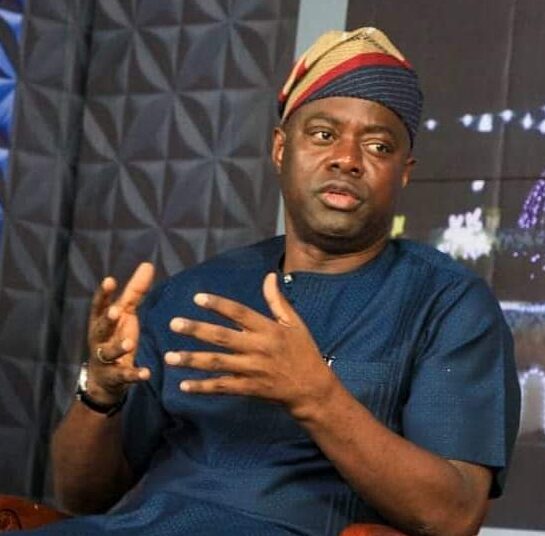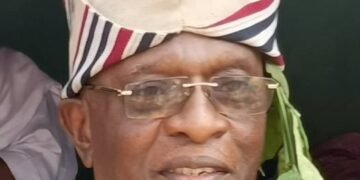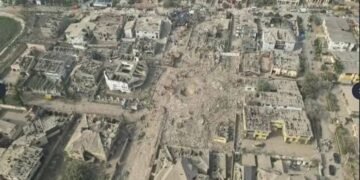One hallmark of excellent governance, is the ability of government to arrive at a healthy balance between welfare of citizens and the development of the political space governed. Said differently, the government must pay attention to wellbeing of the citizens, and at the same time, carry out acts, and realise visions that create a future for the citizens. It is important for government to pay salaries, allowances, pensions, gratuities, run hospitals, security outfits, respond to emergencies, and do all such sundry acts that government target at giving its citizens a good life. The government however cannot, as our people say, eat with all the ten fingers.
Government must also maintain existing infrastructure, conceive and build newer, more desirable ones, and provide facilities and socio-economie tools and environment that make it possible for citizens to be productive, thereby able to contribute to development of society. Governments cannot justify lack of development by reason only of providing social services.
Oyo State government in the last four years, manifestly has shown an impressive record of balance between keen concern for the welfare of citizens and a vision for development. It has consistently ensured that the welfare components of governance are addressed with commitment: salaries of civil servants in the State are promptly paid, (month-on-month), arrears of pensions and gratuities, progressively paid-down in an orderly, transparent manner, burdensome school levies abolished. Ladoke Akintola University of Technology (LAUTECH) originally owned by two States, became
LAUTECH owned by Oyo State ALONE and expanding in size, faculties and campuses; the State now has additional Universities and Polytechnics; there are credible scholarship programmes, (including, admirably), for students of the Nigerian Law Schools, iconic health facilities that saw the State through the dreadful COVID 19 pandemic. This list can go on, and on.
These feats, can be attributed in the main to a manifestly prudent financial regime of the resources of the State, in another large part, to the creative, affordable, economically realistic State taxes that increased the internally generated revenue of the State over the last four years.
What can be said without doubt however is that, all the above feats have been, and continues to be achieved from the limited resources available to the State, not from any loans or debt stock contracted by the State government. This also accounts for the relatively enviable position of the State on the low-borrower position of the State on the chart: the future of Oyo State has not been borrowed-away into suffocating indebtedness.
In addition to the projected revenues expected to accrue to the State under the Appropriation Law passed by the House of assembly at its sitting of Tuesday 19th December 2023, the Government now has a request pending before the House of Assembly, to contract a loan of 150 billion naira from the AFREXIM and ACCESS banks to complete the Senator Rasheed Ladoja Ring Road now under construction by the State.
The Senator Rasheed Ladoja Ring road project is one of the best thought-out pieces of infrastructure propositions that promises to be a game changer, not only for Ibadan, (the hub of development and socio-economic, cultural and educational activities in various parts of the State), but for ingress and egress into various parts of the South West of Nigeria. It has been on the minds of previous governments in the State, but it is the present government that has taken it up with considerable engineering verve, and driven the project into significant accomplishments, completion virtually in view.
The project will suck traffic coming from Lagos, and deliver these to Ile-lfe road: away to Osun, Ekiti, Ondo and Edo States, for those who have no need to pass through Ibadan. It will do the same for traffic going to Lagos from these States, which have no need to pass through Ibadan.
For Oyo State, especially for Ibadan and all its inhabitants, this will translate into a monumental vehicular relief and relative peace from the stress that the volume of traffic that daily pour into and out of the regular federal highways, impose on Ibadan and her inhabitants on a daily basis. A significant number of these vehicles only pass through, having no need to be in Ibadan at all.
However, this is a project that now need to be financed into completion by a debt stock. This debt is to be incurred by the State. It will be paid by the State, every citizen of the State, as repayments fall due.
Since this is not a circular road that will circulate through every part of the State: Ibarapa, Oke Ogun, Ogbomoso, and Oyo zones of the State, there has to be equity into any State contracted indebtedness as there is bound to be, in the repayment. All parts of the State will ultimately participate in the repayment regime, all parts of the State should have some form of direct benefits (projects) deriving from monies borrowed.
Should not the loan be rationalised into a higher sum, say, 200 billion naira? This leaves enough funds to complete the Senator Rasheed Ladoja Circular road as desired, but with 50 billion naira to execute some high-impact projects in the other zones of the State as well. The lender banks must have made appropriate determinations on the viability of the projects, done the required risk assessment and concluded that Oyo state is credit-worthy enough to attract the finance window. When in future, the State is repaying the loan, the other zones will also have important projects they can point to as the value-adding projects in their zones which explains and justifies consequential debt repayments.
A government that is committed to improving the lives of its citizens and creating a pathway for real development cannot shy away from the imperatives of seeking appropriate finances to realise these objectives. The Rasheed Ladoja Circular Road proposition is not borrowing to finance consumption. The project should have been delivered three governments ago. The other zones of the State are also desirous of development and impactful projects in their vicinities. Per capita, Ibadan will pay more than any other zone of the loan, but it will not pay every kobo alone.
The State Executive Council and the House of Assembly should also continue to be conscious of the debt burden that this project is bound to impose on the finances of the State in the years of repayments. As has been observed earlier, a major sector that will benefit from this infrastructure are vehicles in transit to or from Lagos, not the ordinary residents of Oyo State. Oyo State should not continue to pay debts for a piece of infrastructure constructed from borrowings, and which will require finance to maintain after it has been delivered,and to make secure, day and night. Users of the road will expect the State to extend the Light Up Oyo State initiative.to the road, incur expenses on security, provide health and ambulance services, and maintain the road to retain the excellence of its construction.
Users of the infrastructure should be willing to pay a modest toll, or alternatively, use the free Federal Government highway, through lwo Road interchange to undertake their voyages. Most of these will be users not ordinarily resident in Oyo State, who pay no taxes to the State.
The House of Assembly has an abiding duty to support the Executive in achieving this landmark development project, but must endeavour to weave into any approval, a mandate that will create a pathway for repayment, that will not impose an avoidable burden on citizens in the years of repayments which will soon be upon us.
January 18, 2024
Rt. Hon. (Dr.) Akin. Onigbinde, SAN (Former Speaker, Oyo State













